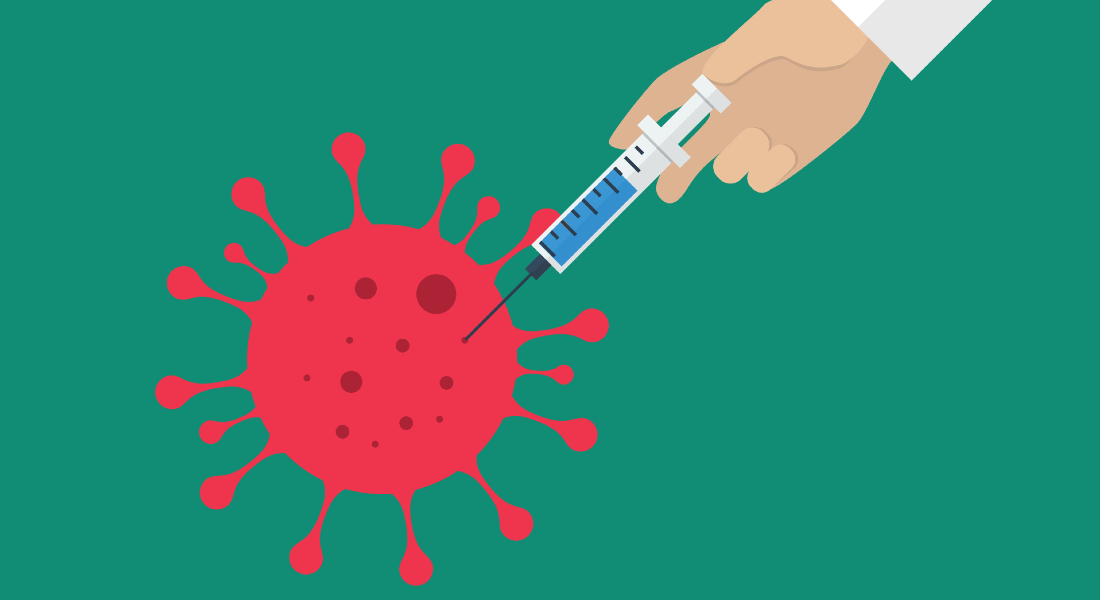COVID-19 vaccine candidate based on UCPH research ready for testing on humans
A COVID-19 vaccine candidate developed at the University of Copenhagen has just been approved for phase 1 testing on humans. The research results are promising so far.

A few days from now the first human will be vaccinated with a Danish vaccine candidate against COVID-19. It is developed by a team of researchers at the University of Copenhagen in collaboration with the companies AdaptVac, ExpreS2ion Biotechnologies and Bavarian Nordic. The vaccine candidate, ABNCoV2, has just been approved for human clinical testing. So far, the research data look promising.
’Our vaccine candidate is characterised in that it elicits a strong immune response in animals. We hope and believe that the strong immune response both results in effective and long-lasting protection’, says Professor Ali Salanti.
In January this year, the researchers from the Department of Immunology and Microbiology at the Faculty of Health and Medical Sciences at UCPH published the results of the effect of the vaccine. They showed that one dosage of ABNCoV2 is very efficient. And two vaccinations resulted in an unprecedented high immune response.
‘If the results of the clinical test are just as promising as we expect them to be, we hope the vaccine will be ready by the end of 2021 or beginning of 2022’, says Associate Professor Morten Agertoug Nielsen.
Strong response can prevent mutations
The vaccine design follows the same principle as the HPV vaccine. It provokes a strong immune response in animals, that is, protection against the virus. The researchers hope for a so-called ‘full response’, which prevents the virus completely from entering the body.
‘If the virus is unable to enter the body, it is unable to mutate, which of course is vital in fighting this virus’, says Associate Professor Adam Sander and continues:
‘Aside from the fact that our vaccine elicits this extremely strong immune response, it may also be able to create a very long-lasting response, which means that you will be immune to the virus for a long time period, perhaps for years, but we will not know for certain until we have tested it on humans’.
The researchers expect that the vaccine can be stored at refrigerator temperature. This is important when it comes to fighting the virus globally, Ali Salanti explains.
‘It means that it may also be distributed to parts of the world that are unable to store it at very low temperatures.’
To defeat COVID-19 we need to have the best weapon
Radboud University Medical Centre in the Netherlands is responsible for the clinical trials, and the recruitment of test subjects has already begun. The first subjects will be given two vaccines one month apart, and they will then be monitored closely to assess immune responses and identify potential side effects. The researchers do not expect to see any side effects to the vaccine, though.
‘Fighting this pandemic is a marathon, and we need strong and lasting weapons. Right from the start, our goal has been to develop the best vaccine. And we believe we have managed to do so’, says Morten Agertoug Nielsen.
The vaccine, ABNCoV2, was developed at the University of Copenhagen within the Prevent nCoV project. It will be produced by AGC Biologics. The vaccine has been tested on rabbits in accordance with the rules in force regarding side effects. No side effects have been detected.
The research is funded by the Carlsberg Foundation, the Independent Research Fund Denmark, Horizon 2020 and Gudbjørg and Ejnar Honoré’s Foundation.
* The Prevent-nCov consortium consists of the companies AdaptVac and ExpreS2ion and the Department of Immunology and Microbiology (UCPH), the Leiden University Medical Center, the Institute for Tropical Medicine (University of Tübingen), the Radboud University Medical Center and the Laboratory of Virology (Wageningen University).
* Together, Associate Professor Morten Agertoug Nielsen, Associate Professor Adam Sander and Professor Ali Salanti have established the spinout NextGen Vaccines, which together with the private biotech company ExpreS2ion has established the joint venture AdaptVac. All three cooperate on developing new types of vaccines, including the vaccine against the new type of corona virus.
* AdaptVac has entered into an agreement with the global company AGC Biologics on producing the vaccine.
* In addition, AdaptVac has entered into a licence agreement with the company Bavarian Nordic on using the vaccine technology developed by the researchers at UCPH, as well as a license agreement with the company ExpreS2ion Biotechnologies on using the proprietary S2 insect cell-based protein production technology, ExpreS2™. UCPH owns the patent on the vaccine technology. The agreement (sublicence) allows the company to use the patented vaccine technology in this context.
Contact:
Associate Professor Morten Agertoug Nielsen
mortenn@sund.ku.dk
+45 28 57 54 89
Associate Professor Adam Sander
asander@sund.ku.dk
+45 30 11 15 29
Professor Ali Salanti
salanti@sund.ku.dk
+45 28 75 76 76
